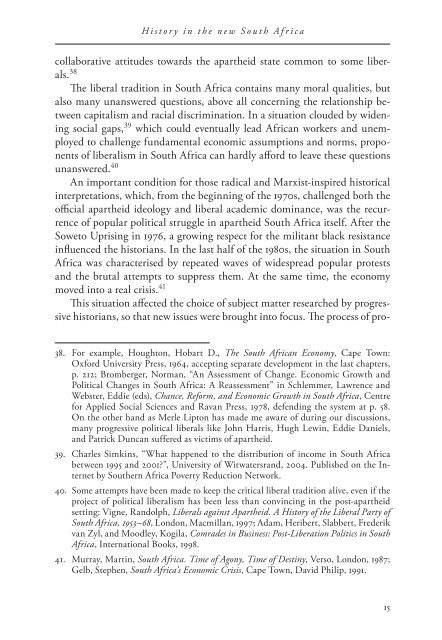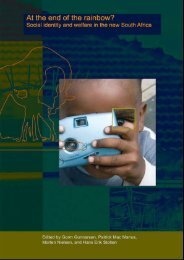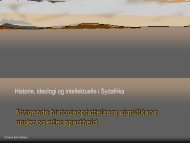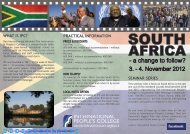History Making and Present Day Politics - Stolten's African Studies ...
History Making and Present Day Politics - Stolten's African Studies ...
History Making and Present Day Politics - Stolten's African Studies ...
You also want an ePaper? Increase the reach of your titles
YUMPU automatically turns print PDFs into web optimized ePapers that Google loves.
H i s t o r y i n t h e n e w S o u t h A f r i c a<br />
collaborative attitudes towards the apartheid state common to some liberals.<br />
38<br />
The liberal tradition in South Africa contains many moral qualities, but<br />
also many unanswered questions, above all concerning the relationship between<br />
capitalism <strong>and</strong> racial discrimination. In a situation clouded by widening<br />
social gaps, 39 which could eventually lead <strong>African</strong> workers <strong>and</strong> unemployed<br />
to challenge fundamental economic assumptions <strong>and</strong> norms, proponents<br />
of liberalism in South Africa can hardly afford to leave these questions<br />
unanswered. 40<br />
An important condition for those radical <strong>and</strong> Marxist-inspired historical<br />
interpretations, which, from the beginning of the 1970s, challenged both the<br />
official apartheid ideology <strong>and</strong> liberal academic dominance, was the recurrence<br />
of popular political struggle in apartheid South Africa itself. After the<br />
Soweto Uprising in 1976, a growing respect for the militant black resistance<br />
influenced the historians. In the last half of the 1980s, the situation in South<br />
Africa was characterised by repeated waves of widespread popular protests<br />
<strong>and</strong> the brutal attempts to suppress them. At the same time, the economy<br />
moved into a real crisis. 41<br />
This situation affected the choice of subject matter researched by progressive<br />
historians, so that new issues were brought into focus. The process of pro-<br />
38. For example, Houghton, Hobart D., The South <strong>African</strong> Economy, Cape Town:<br />
Oxford University Press, 1964, accepting separate development in the last chapters,<br />
p. 212; Bromberger, Norman, “An Assessment of Change. Economic Growth <strong>and</strong><br />
Political Changes in South Africa: A Reassessment” in Schlemmer, Lawrence <strong>and</strong><br />
Webster, Eddie (eds), Chance, Reform, <strong>and</strong> Economic Growth in South Africa, Centre<br />
for Applied Social Sciences <strong>and</strong> Ravan Press, 1978, defending the system at p. 58.<br />
On the other h<strong>and</strong> as Merle Lipton has made me aware of during our discussions,<br />
many progressive political liberals like John Harris, Hugh Lewin, Eddie Daniels,<br />
<strong>and</strong> Patrick Duncan suffered as victims of apartheid.<br />
39. Charles Simkins, “What happened to the distribution of income in South Africa<br />
between 1995 <strong>and</strong> 2001?”, University of Witwatersr<strong>and</strong>, 2004. Published on the Internet<br />
by Southern Africa Poverty Reduction Network.<br />
40. Some attempts have been made to keep the critical liberal tradition alive, even if the<br />
project of political liberalism has been less than convincing in the post-apartheid<br />
setting: Vigne, R<strong>and</strong>olph, Liberals against Apartheid. A <strong>History</strong> of the Liberal Party of<br />
South Africa, 1953–68, London, Macmillan, 1997; Adam, Heribert, Slabbert, Frederik<br />
van Zyl, <strong>and</strong> Moodley, Kogila, Comrades in Business: Post-Liberation <strong>Politics</strong> in South<br />
Africa, International Books, 1998.<br />
41. Murray, Martin, South Africa. Time of Agony, Time of Destiny, Verso, London, 1987;<br />
Gelb, Stephen, South Africa’s Economic Crisis, Cape Town, David Philip, 1991.<br />
15









